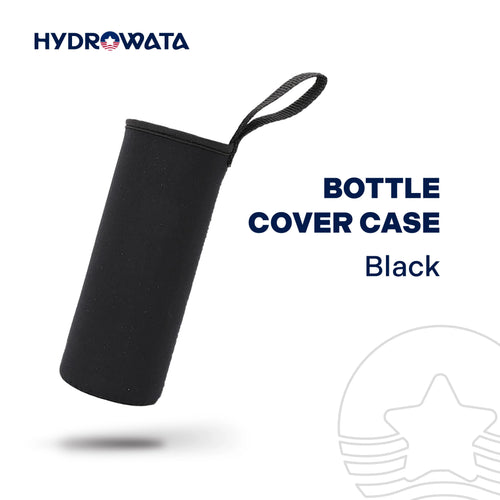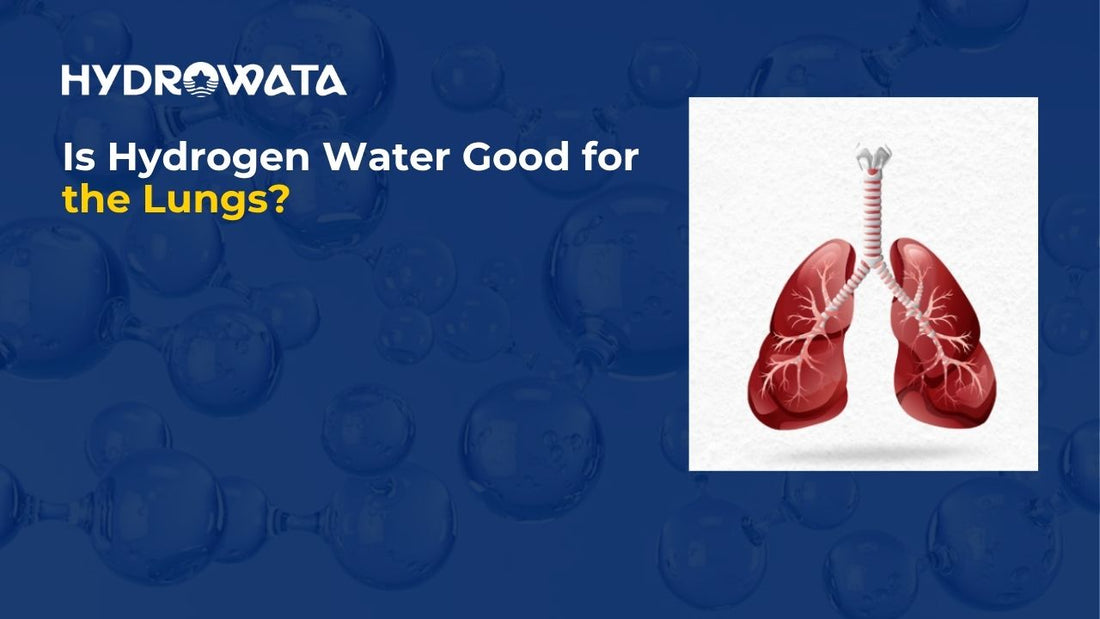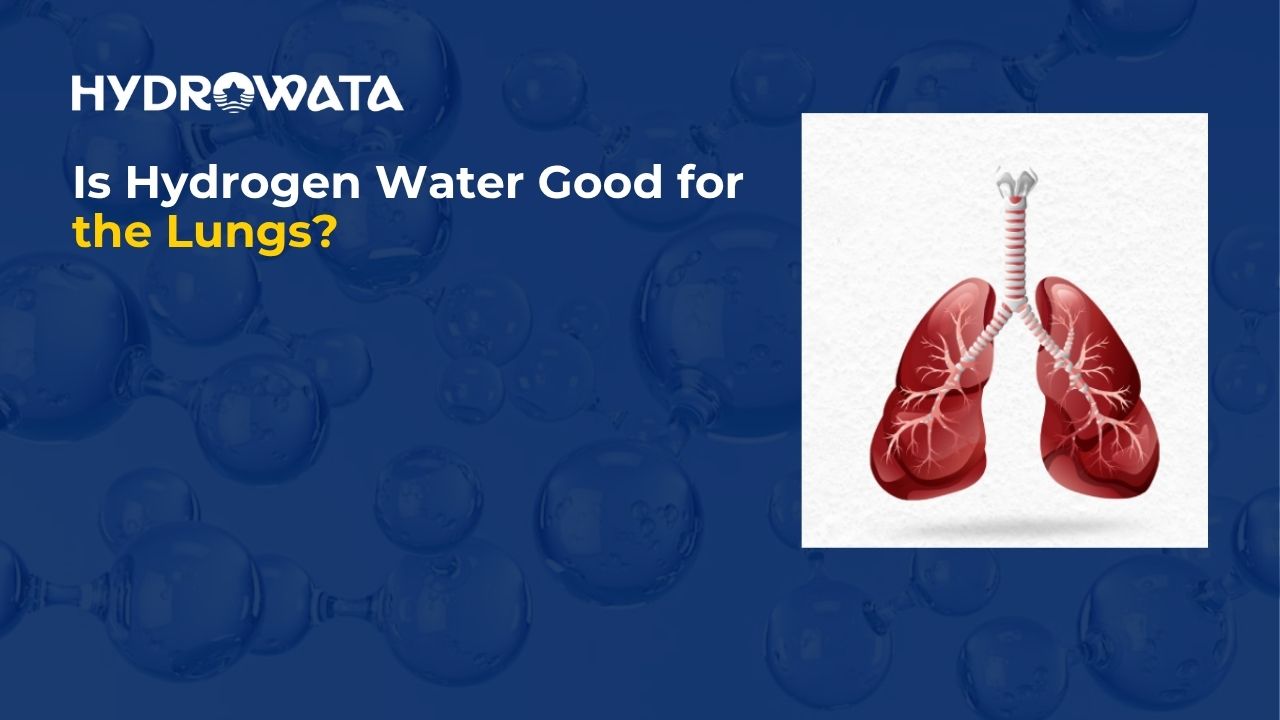In recent years, hydrogen water has become a hot topic in the world of health and wellness, with many claiming it provides powerful antioxidant benefits. But is it actually good for your lungs? With respiratory health being more critical than ever, understanding natural ways to support it is essential. One product making waves in this space is the HydroWata Hydrogen Water Bottle, which promises pure, high-concentration hydrogen-rich water. But how does it work, and can it really benefit your lungs?
Understanding Hydrogen Water

Hydrogen water is simply water that has been infused with molecular hydrogen gas (H₂). This odorless, tasteless gas has powerful antioxidant properties, particularly in neutralizing harmful free radicals in the body.
Unlike other antioxidants, molecular hydrogen is small enough to penetrate deep into cells and tissues, including the lungs. Products like the HydroWata Hydrogen Water Bottle use electrolysis to generate high-concentration hydrogen water on demand. Regular consumption of hydrogen-rich water can help reduce oxidative stress, inflammation, and cellular damage—key factors in many chronic diseases, including those affecting the respiratory system.
The Lungs and Oxidative Stress

The lungs are essential for oxygen exchange, fueling every cell in your body. However, they’re constantly exposed to environmental pollutants, allergens, and pathogens—all of which can increase oxidative stress. This refers to an imbalance between free radicals (reactive oxygen species) and the body’s ability to neutralize them with antioxidants.
When oxidative stress is high, it can damage lung tissue, impair function, and trigger inflammation. Over time, this contributes to the progression of conditions such as chronic obstructive pulmonary disease (COPD), asthma, pulmonary fibrosis, and even lung cancer. Smokers and individuals living in high-pollution environments face particularly high risks.
One major concern is lipid peroxidation, where free radicals attack the fat layers in lung cells, compromising their integrity. This can lead to airway remodeling, reduced elasticity, and compromised oxygen exchange. Inflammation compounds the damage, with cytokines like IL-6 and TNF-α promoting mucus buildup, swelling, and bronchial constriction.
Traditional treatments like corticosteroids and bronchodilators reduce symptoms but don’t always address the root causes like cellular oxidative damage. This is where antioxidants come into play. Natural antioxidants like vitamin C and E help, but recent studies suggest that molecular hydrogen—when consumed via hydrogen-rich water—can be more effective at reaching cellular sites and selectively neutralizing only the most damaging free radicals, such as hydroxyl radicals.
Improving antioxidant intake through safe, daily hydration with hydrogen water may offer a proactive, natural way to support lung health—especially when combined with lifestyle changes like quitting smoking or reducing pollutant exposure.
Scientific Evidence on Hydrogen Water and Lung Health
Reduces Oxidative Stress
Hydrogen water has a remarkably selective antioxidant effect. It neutralizes highly reactive radicals—such as hydroxyl (•OH) and peroxynitrite (ONOO⁻)—which are known to damage DNA, lipids, and proteins in lung tissue. Unlike many antioxidants, it leaves essential reactive oxygen species untouched, ensuring normal immune functions continue uninterrupted.
Boosts Protective Enzymes and Gene Pathways
Beyond directly scavenging radicals, molecular hydrogen activates the Nrf2/HO‑1 pathway, ramping up the body’s own antioxidant enzymes—such as superoxide dismutase, catalase, and glutathione peroxidase. This dual mechanism (direct neutralization plus enzyme activation) helps preserve mitochondrial health and cellular function in lung cells.
Prevents Lung Injury in Animal Models
In studies with mice exposed to cigarette smoke or harmful fine particles, those treated with hydrogen-rich water showed less lung damage, better preservation of lung structure and elasticity, and reduced inflammation compared to untreated animals . In models of ventilator-induced or ischemia-reperfusion lung injuries, hydrogen water also reduced oxidative stress and tissue damage.
Battles Inflammation and Cell Death
Molecular hydrogen suppresses the release of pro-inflammatory cytokines and limits the infiltration of immune cells like neutrophils and macrophages into the lung parenchyma. This helps reduce airway swelling, mucus buildup, and alveolar damage. It also protects against programmed cell death (apoptosis), slowing deterioration in chronic lung disease.
Clinical Promise in Humans
In early clinical trials, patients with asthma or COPD who received hydrogen-rich steam showed reduced airway inflammation and improved oxygen saturation. While full-scale trials are still forthcoming, these initial results underscore the potential for hydrogen-based interventions in human respiratory health .
Potential Benefits for the Lungs
Hydrogen water offers a range of potential benefits for the lungs, thanks to its unique biological properties. Here’s a breakdown of how it may help respiratory health:
Neutralizes Harmful Free Radicals
Hydrogen-rich water selectively targets and neutralizes hydroxyl radicals—arguably the most damaging free radicals in the lungs. This can reduce cellular damage, especially in individuals exposed to pollutants, cigarette smoke, or allergens.
Reduces Inflammation
Inflammation is a key driver in asthma, COPD, and other chronic lung diseases. Hydrogen water has been shown to downregulate pro-inflammatory cytokines like TNF-α, IL-1β, and IL-6. This helps reduce airway swelling and mucus buildup, improving airflow and reducing coughing or wheezing.
Protects Lung Cells
By preventing oxidative DNA damage and lipid peroxidation, hydrogen water helps maintain the integrity of lung epithelial cells and alveoli. This is crucial for keeping oxygen exchange efficient and preventing tissue scarring or fibrosis.
Supports Oxygen Delivery
In studies with COPD patients, hydrogen water was associated with improved blood oxygen saturation (SpO₂). Better oxygenation can boost energy levels, physical performance, and even cognitive clarity.
Improves Exercise Tolerance
For people with chronic respiratory conditions, even mild exertion can cause shortness of breath. Some studies indicate that drinking hydrogen water may increase stamina and reduce fatigue, making daily activities more manageable.
Synergizes with Medical Treatments
Hydrogen water is not a replacement for prescribed medications, but it can complement them. Its antioxidant and anti-inflammatory effects may reduce the burden on the body, making other treatments more effective.
Safe and Non-Toxic
Unlike some antioxidants that can cause imbalances in large doses, molecular hydrogen has no known toxicity, even in high concentrations. This makes it ideal for long-term use.
If you’re facing respiratory issues or simply want to protect your lungs from everyday pollution, hydrogen water may offer a simple, science-backed tool to support your efforts naturally.
If You’re Looking for a Reliable Solution: Meet HydroWata Hydrogen Water Bottle

If you want to experience the potential lung-protective effects of hydrogen water, the HydroWata Hydrogen Water Bottle offers a convenient and efficient solution. Designed for daily use, this sleek, portable device uses advanced PEM electrolysis technology to generate high-concentration hydrogen water (up to 5 ppm) in just 3–5 minutes.
The HydroWata bottle is made from BPA-free materials, features a self-cleaning system, and includes a USB-rechargeable battery—perfect for travel, the gym, or home use. With just a push of a button, you can enjoy fresh, antioxidant-rich water that may help protect your lungs from oxidative stress and inflammation.
Unlike store-bought hydrogen water, HydroWata lets you generate H₂ on demand, ensuring maximum potency and freshness. Whether you're dealing with asthma, COPD, or want a wellness boost in polluted environments, HydroWata makes integrating hydrogen water into your routine simple and affordable.
Breathe easier and hydrate smarter—with HydroWata.
Conclusion
Hydrogen water is more than just a wellness trend—it’s a promising tool in the fight against lung damage caused by oxidative stress and inflammation. While research is still growing, early findings are compelling, especially for people with chronic lung conditions like asthma or COPD.
The HydroWata Hydrogen Water Bottle makes it easy to tap into these potential benefits daily. Safe, convenient, and backed by science, hydrogen water could be a valuable addition to your respiratory health routine. As always, consult your healthcare provider before beginning any new supplement or health protocol.
FAQs
1. Is hydrogen water safe to drink daily?
Yes, hydrogen water is safe to drink daily, but it should not replace regular water.
2. Can hydrogen water help with asthma or COPD?
Preliminary studies suggest it may improve oxygen levels and reduce inflammation, but it's not a substitute for prescribed medications.
3. How quickly can I feel results from hydrogen water?
Some people report improved energy and breathing within a few weeks, especially with consistent use.
4. What makes HydroWata different from bottled hydrogen water?
HydroWata generates fresh, high-concentration hydrogen water on demand, ensuring maximum effectiveness and cost-efficiency.
5. Can hydrogen water replace inhalers or other lung medications?
No. It may support lung function, but it should not replace prescribed treatments. Always consult a healthcare professional.
References:
Molecular Hydrogen in the Treatment of Respiratory Diseases
Molecular hydrogen is a potential protective agent in the management of acute lung injury





